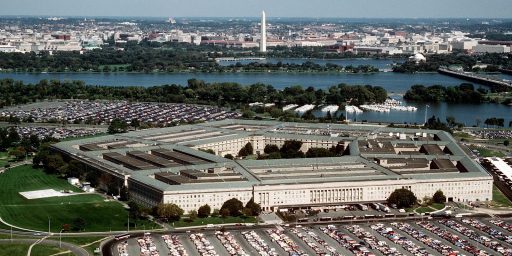The Defense Budget Is Not A Jobs Program
The people trying to undo the Defense Budget sequestration cuts are making some pretty weak arguments.
George Mason University economist Stephen Fuller is out with a study [PDF] in connection with the Aerospace Industries Association that estimates that as many as 2.14 million jobs could be lost as a result of the sequestration cuts set to go into effect in January 2013. It’s worth mentioning, of course, that Fuller’s study concentrates heavily on the Defense Industry and that the AIA represents most of the top defense contractors in the United States so one should perhaps takes some of the claims the study makes with a grain of salt. The AIA obviously wants to stop the defense cuts that are part of sequestration, and now they have a study that purports to show that those cuts will cost millions of jobs. Perhaps there is some truth in this, but that is hardly a reason to stop the sequestration cuts and return the budget to the mess it was in prior to August 2011.
Indeed, Christopher Preble argues that we should let the cuts occur:
To be clear, sequestration is not the best way to cut the military budget, or federal spending overall. It wasn’t supposed to happen at all; the threat of spending cuts was supposed to compel the various parties to reach a compromise. But it may be the only feasible way to cut spending. And it isn’t going to get any easier in the future.
(…)
The GOP has a straightforward way out of the box: allow the defense and nondefense cuts to go forward, refuse a tax increase, and renegotiate a debt reduction deal that doesn’t leave entitlements—the real drivers of our long-term fiscal calamity—off the table.
Sequestration likely won’t be as bad as special interests and those in favor of ever-increasing military spending claim. The reductions would only apply to FY 2013 budget authority, not outlays. The Pentagon and Congress will then have greater flexibility starting in FY 2014 to adjust the reductions under the BCA spending caps. In the meantime, many programs could continue on funding already authorized.
We must also keep the cuts in proper perspective. The DoD base budget under sequestration would total $469 billion, about what we spent in 2006, which was not exactly a lean year for the Pentagon. And as for the claim that the military cuts will result in perhaps one million lost jobs, that seems implausible considering that the cuts would amount to less than three tenths of one percent of GDP.
More importantly, though, Preble points out that we need to stop looking at the Defense Department budget, or indeed any Federal spending, as a jobs program. The purpose of defense spending should be to provide an adequate defense to defend the national interests of the United States. Once of the main reasons that defense spending has grown so much over the past decades has been the fact that it was viewed by Congress as a way to pass out pork to their districts and states. Indeed, there’s been more than one example over the years of a weapon’s program that the Pentagon doesn’t even really want, but which it is forced to accept because Congress insists on funding it, often for reason that have next to nothing to do with national defense and a whole lot to do with getting re-elected. Until an independent commission was established, it was next to impossible to shut down or reduce the size of a military base anywhere in the United States because Members of Congress would work together to prevent closure. Their constituents liked it, I’m sure, but it wasn’t doing the country any good, and the same goes for spending money on the military not because we need it for our defense, but because a Congressman doesn’t want to get his constituents, or his donors, angry at him.
If the opponents of the defense sequestration cuts could make the case that they would harm our defense posture in a significant way, I’m sure they would have by now. Some, such as Senator John McCain, have tried to make that case but the exhortations simply don’t stand up to examination. The main reason the arguments that people like McCain make come off as absurd, is that we really aren’t even talking about actual cuts in defense spending here. Instead, we’re talking about are cuts in the rate of growth of spending. By the time we get to the end of the decade long period over which the cuts would go into effect, the Pentagon wouldn’t end up much worse off than it would have under the budget that was under consideration last August before the deal was made:
Rather than cutting $400 billion in defense spending through 2023, as President Barack Obama had proposed in April, the current debt proposal trims $350 billion through 2024, effectively giving the Pentagon $50 billion more than it had been expecting over the next decade.
With the wars in Iraq and Afghanistan winding down, experts said, the overall change in defense spending practices could be minimal: Instead of cuts, the Pentagon merely could face slower growth.
“This is a good deal for defense when you probe under the numbers,” said Lawrence Korb, a defense expert at the Center for American Progress, a left-leaning research center. “It’s better than what the Defense Department was expecting.”
If there are good national security reasons that support the argument that we shouldn’t allow the defense cuts to be made, then the opponents of those cuts should make them. If not, then they shouldn’t rely on the idea that the Defense Budget is some kind of social welfare program because we cannot afford to think like that anymore.







Any dudget defict reduction program should start by reducing the DoD budget.
Unfortunately the sequestration cuts may harm defense in a real way, because they will no doubt end up falling on programs and classes of expenditures with the weakest political constituencies, rather than the ones least important to defense. Big-ticket weapons systems backed by armies of lobbyists will mostly avoid the axe, whether they really make us safer or not.
Still, it’d be a start. Starve the Military-Industrial beast, I say.
Even if you like defense jobs, you would need to argue against opportunity costs, and that there might be better US jobs to fund. More tanks or a better freight rail infrastructure?
Republicans made a deal. Now they want to welch on the deal. Show of hands…who is suprised?
The idea that we cannot cut the DoD budget…which was $700B in 2011…by $35B a year for a decade…without harming National Security is ludicrous.
Just don’t cut the Groton Sub Base…that’s all I’m saying…
Just to remind people of my position, I believe that the defense budget should be cut dramatically and that needn’t compromise national security.
Those who are reacting to this as though it were a bad thing have forgotten what our military does. Its primary mission is to provide security for the country and its primary means of doing that are killing people and breaking their stuff. That’s a necessary evil. We should only do as much of that as is absolutely necessary. Doing more is a complete waste.
Bingo!
Like any federal department there’s a lot of fat at DOD which needs to be jettisoned. Plus reductions to growth rates in spending are not actual cuts, unless one has been mind numbed by inside-the-Beltway thinking. The GOP on this issue has jumped the shark tank.
“More importantly though…we need to stop looking at the Defense Department budget, or indeed any federal spending, as a jobs program.”
What a wonderful world it will be, sir, when we achieve all of those noble goals that would accompany that accomplishment; when congressmen place the welfare of the nation above that of their district and re-election to congress is less important than doing the righteous thing.
Imagine a Defense Dep’t in which a weapons system is terminated because it no longer meets the needs of national safety and the Generals and Admirals and the staffs involved do not consider the effect on their careers because — well — just because there are other important considerations, you know.
Oh, Mr Mataconis! What a great world we will live in when that happens!
Are you holding your breath?
All too true, Doug. But it is always entertaining to watch conservative congresscritters become Keynesians for a day when the subject is defense. (Bad Keynesians. Actually they become the Republican caricature of Keynesians by wanting to spend on Defense even in good times. And in a recession, Defense has a very low multiplier.)
Just your standard scare mongering from the powerful military industrial complex.
While I don’t think the government should cut defense back to bare bones that could put the security of the country at risk, I think there are tons of places in the defense budget that could use cutting or trimming.
I don’t know enough about specific industries that might be affected, but I definitely don’t think the defense budget should be maintained in order to prevent job losses in the private sector. Not to mention, private sector companies might have layoffs etc, but I imagine they would at some point rethink the business model, and look for other avenues of revenue. It isn’t like the technologies can’t be tweaked, applied and marketed in some other way.
Doug, as someone who completely agrees with the base of your argument, I have to point out (as someone who has spent 6 of the last 8 yrs working on an Army base) the defense budget IS a jobs program.
Whether you like it or not, that is how Congress views it, and that is how their constituents view it. No, it is not right, but it is a fact.
@OzarkHillbilly: My former company was a jobs program until those jobs were shipped to China and my job as an engineer was one of them. The inflated military budget just encourages international mischief. The US and the world would be better off if the US slashed is war budget by 50%. The main purpose of the DOD is not to defend the citizens of the United States but the interests of multi-national corporations. If they want to hire the military to do that fine, but make them pay for it.
I’m having a vision of Northern Virginia turning into the next Las Vegas, street after street of rotting McMansions, overgrown golf courses, and empty sky boxes at Redskins and Nationals games. Certainly Doug does not want to see that happen.
It shouldn’t be, but I think it is one, Doug. [I see OzarkHillbilly beat me to it].
The entrenched interests will fight tooth and nail to keep the money coming, of course. No surprise there.
But see, the Dems made a very good political point here: if you are seriously committed to bending the cost curve downward (as, say, our friend the Tsar is), the DoD has to be on the table.
I’m fine with a long-term budget approach that slows the rate of growth over time (below GDP growth). The problem we have, of course, is a really nasty recession followed by an anemic recovery. Persistant high unemployment, etc. But stuff. The timing for budget cutting is terrible.
I’d prefer to shift money to what I consider to be more productive areas (infrastructure work, IMO, beats the hell out of more military hardware, even if that infrastructure work is overpriced), but I try to stay realistic. That ain’t happening without a Democratic wave election, and we’re not going to get that.
@Rob in CT:
Hah. Bad stuff. Bad.
I needed more sleep than I got last night.
If the defense budget is going to take a hair cut then other programs should also take a hair cut since they will not longer be needed.
Why extended the Silver line in northern Virginia into Loundon County since all of the trains will be going by empty office buildings after severe Defense contractor cut backs.
The number of engineering programs in the U.S. will need to be cut since thousands of engineers will be without jobs and without prospects of future employment. The number of programs in national security should also be cut back since there will be fewer jobs.
Veterans jobs programs should be cut since the number of unemployable veterans will grow massively and there be few prospects for new jobs.
There are many transportation projects that will need to be ended since the number of people is certain parts of the country such as Huntsville Alabama will be going down.